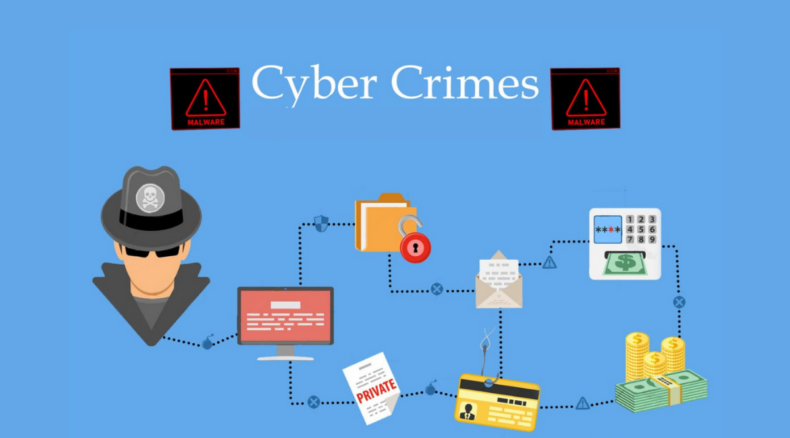What is Cyber Crime?
Cyber crime, as the name suggests, is a type of crime that is committed in the cyber world. This crime is a new type of crime that has expanded its roots to almost every aspect of life of the Netizens. Our Indian law has not defined the term cyber crime as such; however, an act has been introduced in order to tackle with these types of crimes, which we know as the Information Technology Act 2000 or the IT Act 2000
The term cyber crime is a very wide term and therefore cannot be defined in just one to two sentences. However, if we look at the nature of this crime, it can be said that it is that type of crime in which computers and computer networks are put into use or more specifically, abuse, and the crime is committed either ‘through’ them or ‘to’ them or both.
According to a survey by Ipsos, the frequency of complaint filed by Indians are much higher, that is, 32% higher compared with that of the U.S., U.K. and other technologically advanced countries where it ranges only about 11- 15%. The 32% data is for the complained cases let alone the non complained ones. One of the main causes of such rapid increase in the cases of cyber crimes is our dependency on it, even for the most basic things like shopping, making payment, ordering food, etc. and where there are such uncontrollable dependencies some people out there are definitely going to take advantage of it.

Reasons of Cyber Crime
Some reasons are listed below:
- Easy money without revealing the identity because they use hacked computers and fake or stolen I.P. Address.
- The complex technologies and coding increase the chances of error which the criminals take advantage of.
- They know how to easily fool the bio-metrics; they even use force to do that.
- The evidences which are usually in the form of data can be easily destroyed without leaving behind any trace.
Due to all such reasons, most such cases remain inaccessible. We come across different cases of cyber crimes being committed almost on a daily basis in the newspaper or on the television or through any other person. There they usually narrate the whole procedure through which the crime was committed, these crimes are usually what we technically call as phishing where the fraudsters earn huge amount of money by misleading the victim by acting as a bank manager where they ask for sensitive bank details. But this is not it, cyber crimes are way more advanced than this.
Criminals also commit non cyber crimes with the help of cyber stuffs. Now days, every third person has a social account and they tend to regularly update about their daily life, their personal information like their address, etc. This personal information that a social media account holder gives on his account works as a tracer to the criminals and it becomes easier for them to harm that person, maybe by kidnapping them as they now know about the whereabouts of that person. The other very popular cyber crime is hacking. It has now become so common that even the highly secured websites of government bodies get hacked, let alone the social media accounts of common people. The most common method of hacking is that the hacker usually sends some links to the email or any social account of the victim and the moment the user clicks open that link, the hacker gets access to the computer system of that user. We can also witness such cases where we get spam messages in our e-mails reading that we have won some amount of prize money and in return they ask us about our bank details. This is where many people fall into the trap, even the educated ones. These types of cyber crimes are something that we see on a daily basis. Research has shown that every eight out of ten people have in some or the other way fallen into such traps of cyber crimes and have been victimized.

How it can be stopped?
In India especially it’s a big issue which should be worried about because there are not particular special laws dealing with such crimes. Maybe because, most of the cases go unreported the law makers do not yet know about the intensity of this crime. If such a case ever comes up then we have few provisions in the Indian Penal Code (IPC) and the IT Act to help deal with such cases. Some provisions are mentioned below: Section 67A of the IT Act which sentences the person a maximum of 5 years term imprisonment with fine. Section 354C of the IPC in which the capturing of any such image has to be consensual but its dissemination is non consensual. But one thing to be noted is that this provision does not undertake morphed or photo-shopped images which may have the similar effect. Section 292 of the IPC wherein circulation of any obscene object is punishable.

More amendments and more strict laws will be required, some of which are given below:
- It requires more time to collect evidences in cyber cases, as evidences can be easily destroyed, therefore more time span should be given to the investigating authorities.
- Any matter on the social media is not confined and can be accessed from anywhere; the lawmakers should impose restrictions on the accessibility, or limit it so that the abuse decreases.
- Specific laws should be made on matters such as cyber bullying, children, NCSIA which should consist of all the possible provisions and counterattacks of loopholes so that other numerous acts and laws are not looked for.
- More advanced training should be given to the police officials on this subject. Judicial proceedings on such matters should be specified.
- A special court, if possible, should be introduced so that such cases are dealt separately and also there will be no unwanted accumulation of cases, which we already have.
- The term of imprisonment should be increased for some crimes













